Netflix business model
VerifiedAdded on 2023/06/06
|10
|2775
|67
AI Summary
This article discusses the original business model of Netflix and whether it is an example of a Blue Ocean Strategy or one of the generic strategies. It also examines whether Netflix currently has a competitive advantage using the theory in Barney and Porter.
Contribute Materials
Your contribution can guide someone’s learning journey. Share your
documents today.

Netflix business model
Netflix business model
Institution affiliation
Students
Date
Netflix business model
Institution affiliation
Students
Date
Secure Best Marks with AI Grader
Need help grading? Try our AI Grader for instant feedback on your assignments.
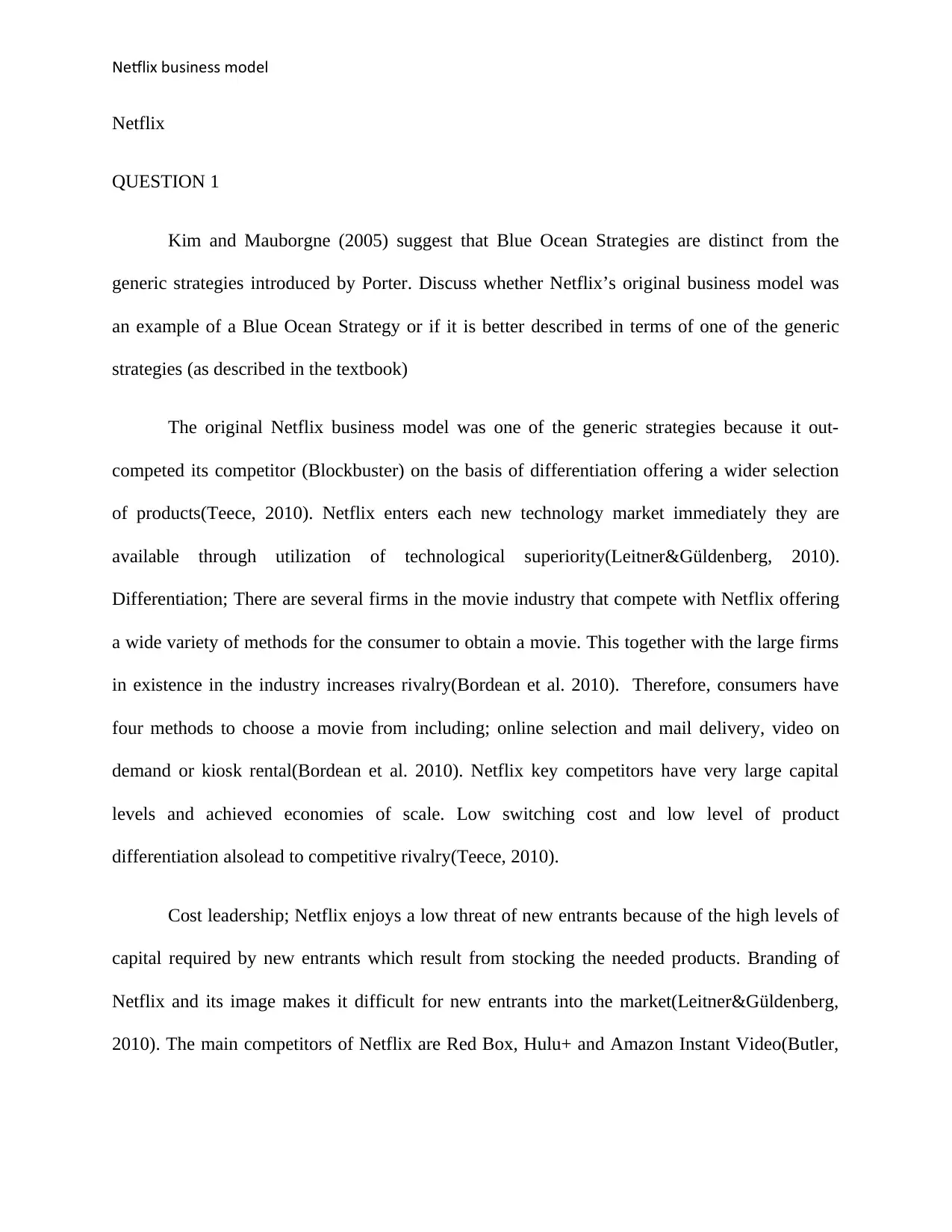
Netflix business model
Netflix
QUESTION 1
Kim and Mauborgne (2005) suggest that Blue Ocean Strategies are distinct from the
generic strategies introduced by Porter. Discuss whether Netflix’s original business model was
an example of a Blue Ocean Strategy or if it is better described in terms of one of the generic
strategies (as described in the textbook)
The original Netflix business model was one of the generic strategies because it out-
competed its competitor (Blockbuster) on the basis of differentiation offering a wider selection
of products(Teece, 2010). Netflix enters each new technology market immediately they are
available through utilization of technological superiority(Leitner&Güldenberg, 2010).
Differentiation; There are several firms in the movie industry that compete with Netflix offering
a wide variety of methods for the consumer to obtain a movie. This together with the large firms
in existence in the industry increases rivalry(Bordean et al. 2010). Therefore, consumers have
four methods to choose a movie from including; online selection and mail delivery, video on
demand or kiosk rental(Bordean et al. 2010). Netflix key competitors have very large capital
levels and achieved economies of scale. Low switching cost and low level of product
differentiation alsolead to competitive rivalry(Teece, 2010).
Cost leadership; Netflix enjoys a low threat of new entrants because of the high levels of
capital required by new entrants which result from stocking the needed products. Branding of
Netflix and its image makes it difficult for new entrants into the market(Leitner&Güldenberg,
2010). The main competitors of Netflix are Red Box, Hulu+ and Amazon Instant Video(Butler,
Netflix
QUESTION 1
Kim and Mauborgne (2005) suggest that Blue Ocean Strategies are distinct from the
generic strategies introduced by Porter. Discuss whether Netflix’s original business model was
an example of a Blue Ocean Strategy or if it is better described in terms of one of the generic
strategies (as described in the textbook)
The original Netflix business model was one of the generic strategies because it out-
competed its competitor (Blockbuster) on the basis of differentiation offering a wider selection
of products(Teece, 2010). Netflix enters each new technology market immediately they are
available through utilization of technological superiority(Leitner&Güldenberg, 2010).
Differentiation; There are several firms in the movie industry that compete with Netflix offering
a wide variety of methods for the consumer to obtain a movie. This together with the large firms
in existence in the industry increases rivalry(Bordean et al. 2010). Therefore, consumers have
four methods to choose a movie from including; online selection and mail delivery, video on
demand or kiosk rental(Bordean et al. 2010). Netflix key competitors have very large capital
levels and achieved economies of scale. Low switching cost and low level of product
differentiation alsolead to competitive rivalry(Teece, 2010).
Cost leadership; Netflix enjoys a low threat of new entrants because of the high levels of
capital required by new entrants which result from stocking the needed products. Branding of
Netflix and its image makes it difficult for new entrants into the market(Leitner&Güldenberg,
2010). The main competitors of Netflix are Red Box, Hulu+ and Amazon Instant Video(Butler,
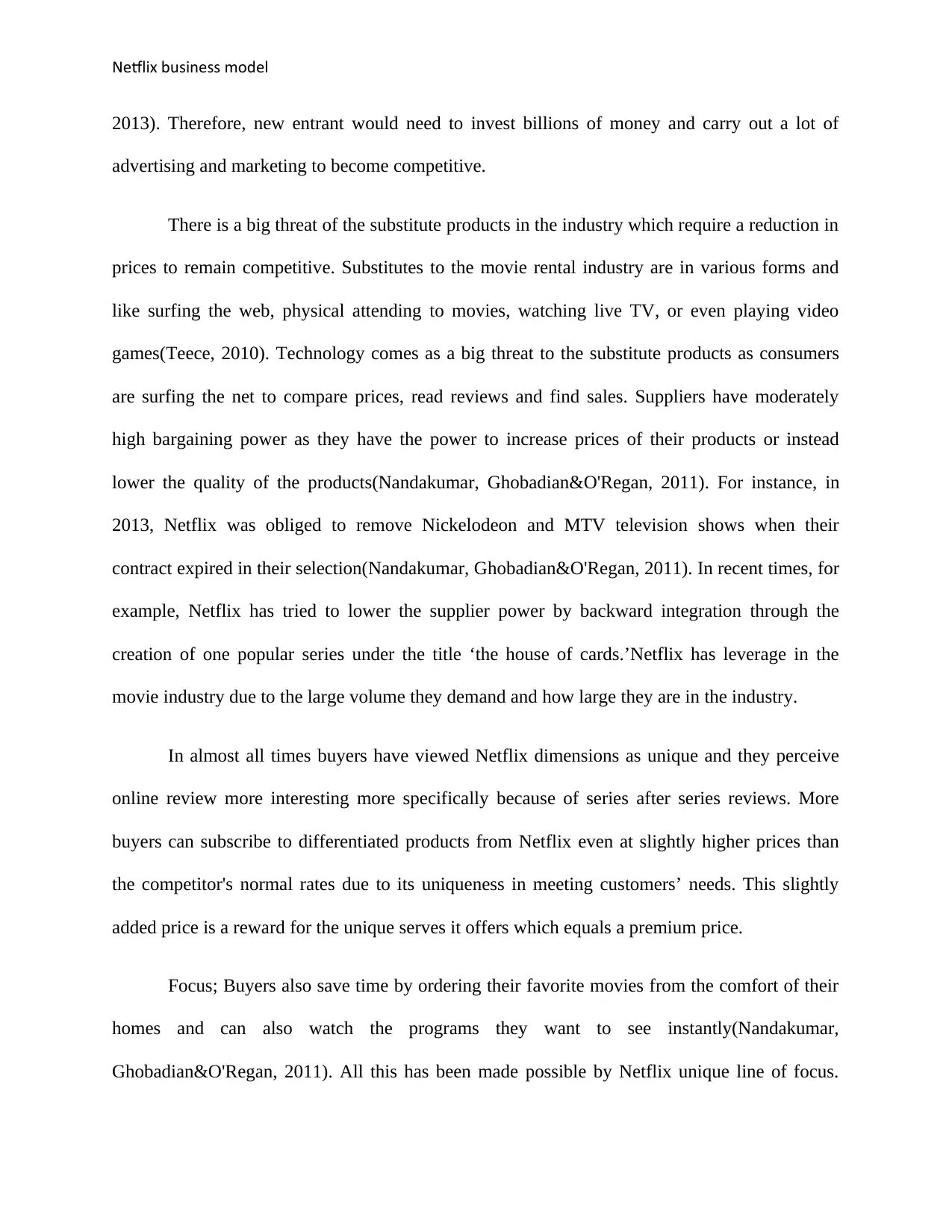
Netflix business model
2013). Therefore, new entrant would need to invest billions of money and carry out a lot of
advertising and marketing to become competitive.
There is a big threat of the substitute products in the industry which require a reduction in
prices to remain competitive. Substitutes to the movie rental industry are in various forms and
like surfing the web, physical attending to movies, watching live TV, or even playing video
games(Teece, 2010). Technology comes as a big threat to the substitute products as consumers
are surfing the net to compare prices, read reviews and find sales. Suppliers have moderately
high bargaining power as they have the power to increase prices of their products or instead
lower the quality of the products(Nandakumar, Ghobadian&O'Regan, 2011). For instance, in
2013, Netflix was obliged to remove Nickelodeon and MTV television shows when their
contract expired in their selection(Nandakumar, Ghobadian&O'Regan, 2011). In recent times, for
example, Netflix has tried to lower the supplier power by backward integration through the
creation of one popular series under the title ‘the house of cards.’Netflix has leverage in the
movie industry due to the large volume they demand and how large they are in the industry.
In almost all times buyers have viewed Netflix dimensions as unique and they perceive
online review more interesting more specifically because of series after series reviews. More
buyers can subscribe to differentiated products from Netflix even at slightly higher prices than
the competitor's normal rates due to its uniqueness in meeting customers’ needs. This slightly
added price is a reward for the unique serves it offers which equals a premium price.
Focus; Buyers also save time by ordering their favorite movies from the comfort of their
homes and can also watch the programs they want to see instantly(Nandakumar,
Ghobadian&O'Regan, 2011). All this has been made possible by Netflix unique line of focus.
2013). Therefore, new entrant would need to invest billions of money and carry out a lot of
advertising and marketing to become competitive.
There is a big threat of the substitute products in the industry which require a reduction in
prices to remain competitive. Substitutes to the movie rental industry are in various forms and
like surfing the web, physical attending to movies, watching live TV, or even playing video
games(Teece, 2010). Technology comes as a big threat to the substitute products as consumers
are surfing the net to compare prices, read reviews and find sales. Suppliers have moderately
high bargaining power as they have the power to increase prices of their products or instead
lower the quality of the products(Nandakumar, Ghobadian&O'Regan, 2011). For instance, in
2013, Netflix was obliged to remove Nickelodeon and MTV television shows when their
contract expired in their selection(Nandakumar, Ghobadian&O'Regan, 2011). In recent times, for
example, Netflix has tried to lower the supplier power by backward integration through the
creation of one popular series under the title ‘the house of cards.’Netflix has leverage in the
movie industry due to the large volume they demand and how large they are in the industry.
In almost all times buyers have viewed Netflix dimensions as unique and they perceive
online review more interesting more specifically because of series after series reviews. More
buyers can subscribe to differentiated products from Netflix even at slightly higher prices than
the competitor's normal rates due to its uniqueness in meeting customers’ needs. This slightly
added price is a reward for the unique serves it offers which equals a premium price.
Focus; Buyers also save time by ordering their favorite movies from the comfort of their
homes and can also watch the programs they want to see instantly(Nandakumar,
Ghobadian&O'Regan, 2011). All this has been made possible by Netflix unique line of focus.
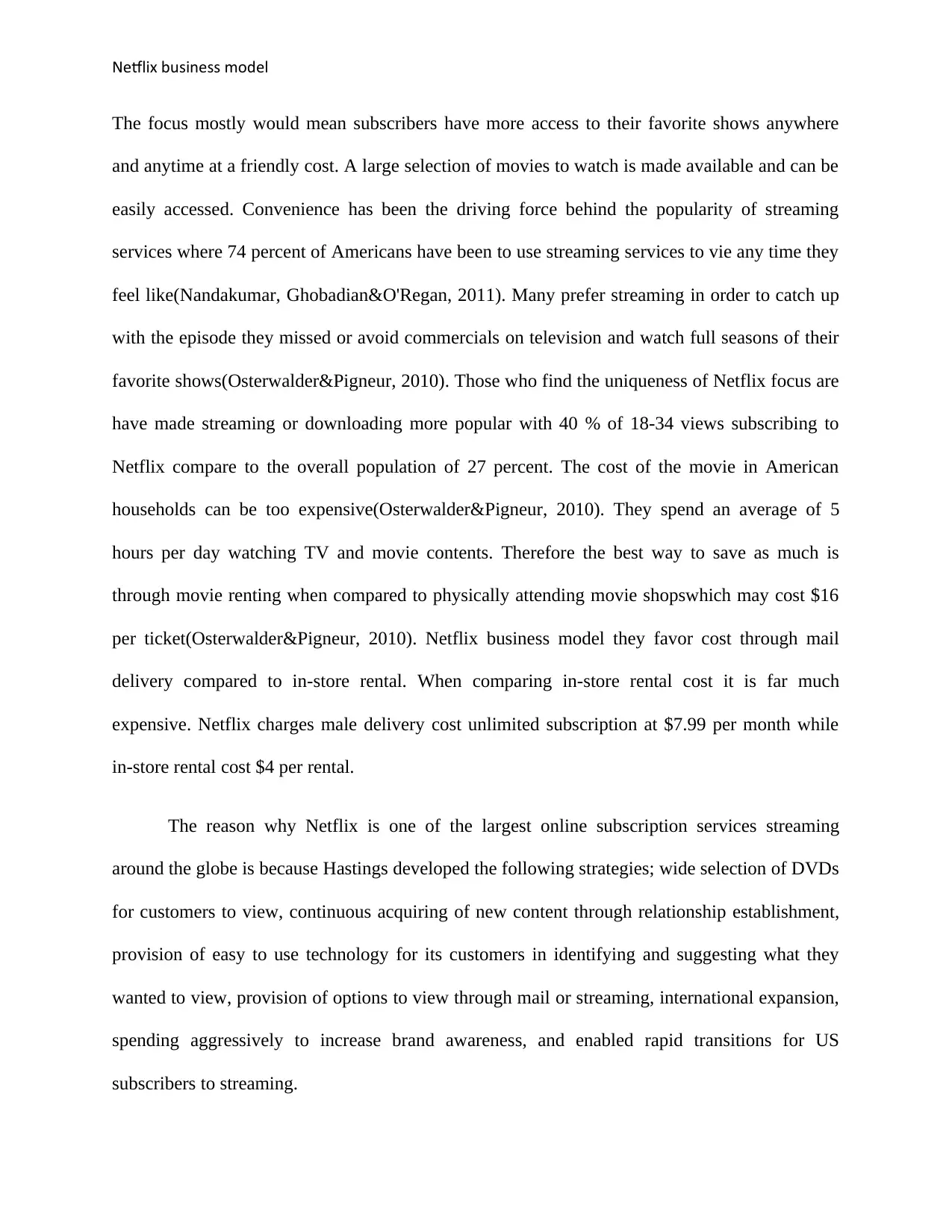
Netflix business model
The focus mostly would mean subscribers have more access to their favorite shows anywhere
and anytime at a friendly cost. A large selection of movies to watch is made available and can be
easily accessed. Convenience has been the driving force behind the popularity of streaming
services where 74 percent of Americans have been to use streaming services to vie any time they
feel like(Nandakumar, Ghobadian&O'Regan, 2011). Many prefer streaming in order to catch up
with the episode they missed or avoid commercials on television and watch full seasons of their
favorite shows(Osterwalder&Pigneur, 2010). Those who find the uniqueness of Netflix focus are
have made streaming or downloading more popular with 40 % of 18-34 views subscribing to
Netflix compare to the overall population of 27 percent. The cost of the movie in American
households can be too expensive(Osterwalder&Pigneur, 2010). They spend an average of 5
hours per day watching TV and movie contents. Therefore the best way to save as much is
through movie renting when compared to physically attending movie shopswhich may cost $16
per ticket(Osterwalder&Pigneur, 2010). Netflix business model they favor cost through mail
delivery compared to in-store rental. When comparing in-store rental cost it is far much
expensive. Netflix charges male delivery cost unlimited subscription at $7.99 per month while
in-store rental cost $4 per rental.
The reason why Netflix is one of the largest online subscription services streaming
around the globe is because Hastings developed the following strategies; wide selection of DVDs
for customers to view, continuous acquiring of new content through relationship establishment,
provision of easy to use technology for its customers in identifying and suggesting what they
wanted to view, provision of options to view through mail or streaming, international expansion,
spending aggressively to increase brand awareness, and enabled rapid transitions for US
subscribers to streaming.
The focus mostly would mean subscribers have more access to their favorite shows anywhere
and anytime at a friendly cost. A large selection of movies to watch is made available and can be
easily accessed. Convenience has been the driving force behind the popularity of streaming
services where 74 percent of Americans have been to use streaming services to vie any time they
feel like(Nandakumar, Ghobadian&O'Regan, 2011). Many prefer streaming in order to catch up
with the episode they missed or avoid commercials on television and watch full seasons of their
favorite shows(Osterwalder&Pigneur, 2010). Those who find the uniqueness of Netflix focus are
have made streaming or downloading more popular with 40 % of 18-34 views subscribing to
Netflix compare to the overall population of 27 percent. The cost of the movie in American
households can be too expensive(Osterwalder&Pigneur, 2010). They spend an average of 5
hours per day watching TV and movie contents. Therefore the best way to save as much is
through movie renting when compared to physically attending movie shopswhich may cost $16
per ticket(Osterwalder&Pigneur, 2010). Netflix business model they favor cost through mail
delivery compared to in-store rental. When comparing in-store rental cost it is far much
expensive. Netflix charges male delivery cost unlimited subscription at $7.99 per month while
in-store rental cost $4 per rental.
The reason why Netflix is one of the largest online subscription services streaming
around the globe is because Hastings developed the following strategies; wide selection of DVDs
for customers to view, continuous acquiring of new content through relationship establishment,
provision of easy to use technology for its customers in identifying and suggesting what they
wanted to view, provision of options to view through mail or streaming, international expansion,
spending aggressively to increase brand awareness, and enabled rapid transitions for US
subscribers to streaming.
Secure Best Marks with AI Grader
Need help grading? Try our AI Grader for instant feedback on your assignments.
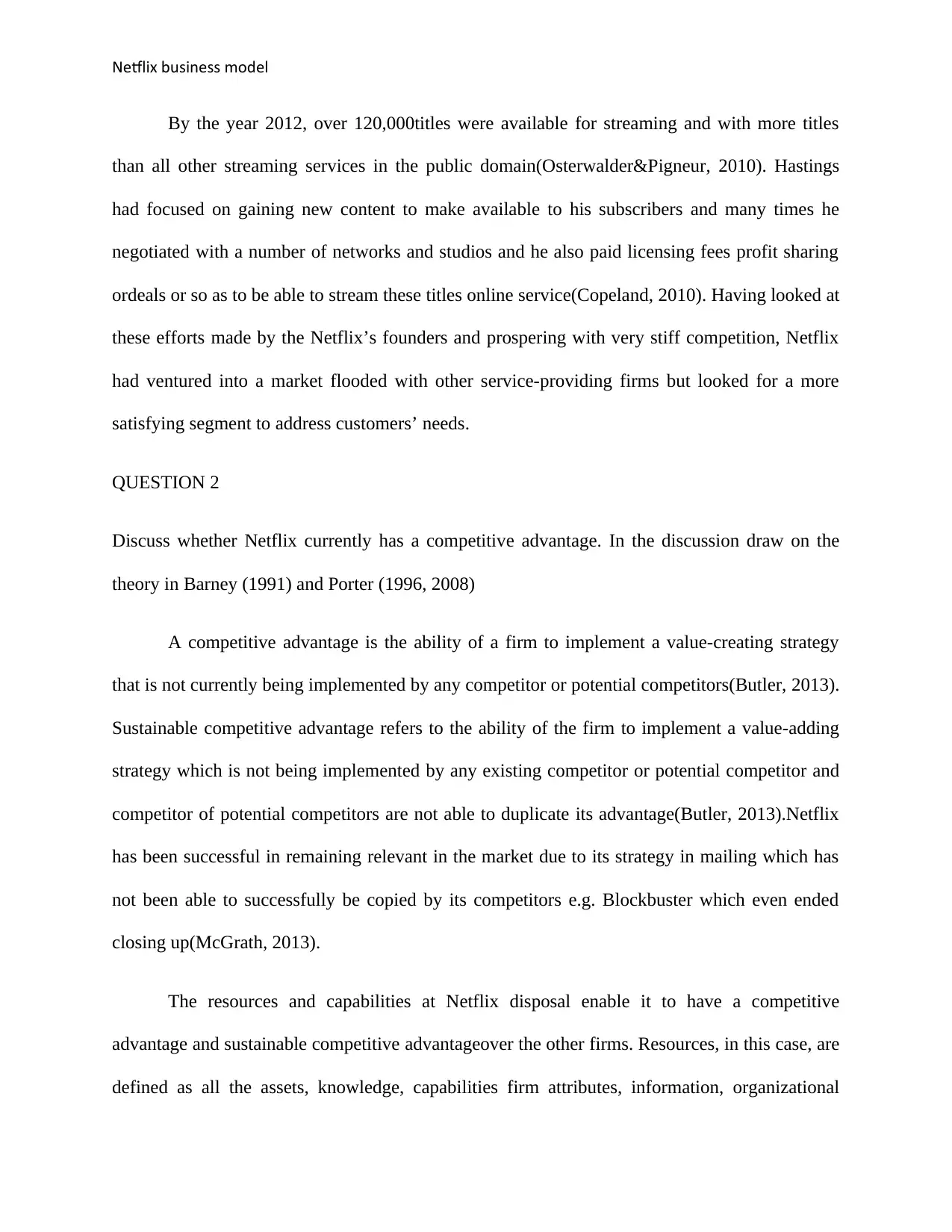
Netflix business model
By the year 2012, over 120,000titles were available for streaming and with more titles
than all other streaming services in the public domain(Osterwalder&Pigneur, 2010). Hastings
had focused on gaining new content to make available to his subscribers and many times he
negotiated with a number of networks and studios and he also paid licensing fees profit sharing
ordeals or so as to be able to stream these titles online service(Copeland, 2010). Having looked at
these efforts made by the Netflix’s founders and prospering with very stiff competition, Netflix
had ventured into a market flooded with other service-providing firms but looked for a more
satisfying segment to address customers’ needs.
QUESTION 2
Discuss whether Netflix currently has a competitive advantage. In the discussion draw on the
theory in Barney (1991) and Porter (1996, 2008)
A competitive advantage is the ability of a firm to implement a value-creating strategy
that is not currently being implemented by any competitor or potential competitors(Butler, 2013).
Sustainable competitive advantage refers to the ability of the firm to implement a value-adding
strategy which is not being implemented by any existing competitor or potential competitor and
competitor of potential competitors are not able to duplicate its advantage(Butler, 2013).Netflix
has been successful in remaining relevant in the market due to its strategy in mailing which has
not been able to successfully be copied by its competitors e.g. Blockbuster which even ended
closing up(McGrath, 2013).
The resources and capabilities at Netflix disposal enable it to have a competitive
advantage and sustainable competitive advantageover the other firms. Resources, in this case, are
defined as all the assets, knowledge, capabilities firm attributes, information, organizational
By the year 2012, over 120,000titles were available for streaming and with more titles
than all other streaming services in the public domain(Osterwalder&Pigneur, 2010). Hastings
had focused on gaining new content to make available to his subscribers and many times he
negotiated with a number of networks and studios and he also paid licensing fees profit sharing
ordeals or so as to be able to stream these titles online service(Copeland, 2010). Having looked at
these efforts made by the Netflix’s founders and prospering with very stiff competition, Netflix
had ventured into a market flooded with other service-providing firms but looked for a more
satisfying segment to address customers’ needs.
QUESTION 2
Discuss whether Netflix currently has a competitive advantage. In the discussion draw on the
theory in Barney (1991) and Porter (1996, 2008)
A competitive advantage is the ability of a firm to implement a value-creating strategy
that is not currently being implemented by any competitor or potential competitors(Butler, 2013).
Sustainable competitive advantage refers to the ability of the firm to implement a value-adding
strategy which is not being implemented by any existing competitor or potential competitor and
competitor of potential competitors are not able to duplicate its advantage(Butler, 2013).Netflix
has been successful in remaining relevant in the market due to its strategy in mailing which has
not been able to successfully be copied by its competitors e.g. Blockbuster which even ended
closing up(McGrath, 2013).
The resources and capabilities at Netflix disposal enable it to have a competitive
advantage and sustainable competitive advantageover the other firms. Resources, in this case, are
defined as all the assets, knowledge, capabilities firm attributes, information, organizational
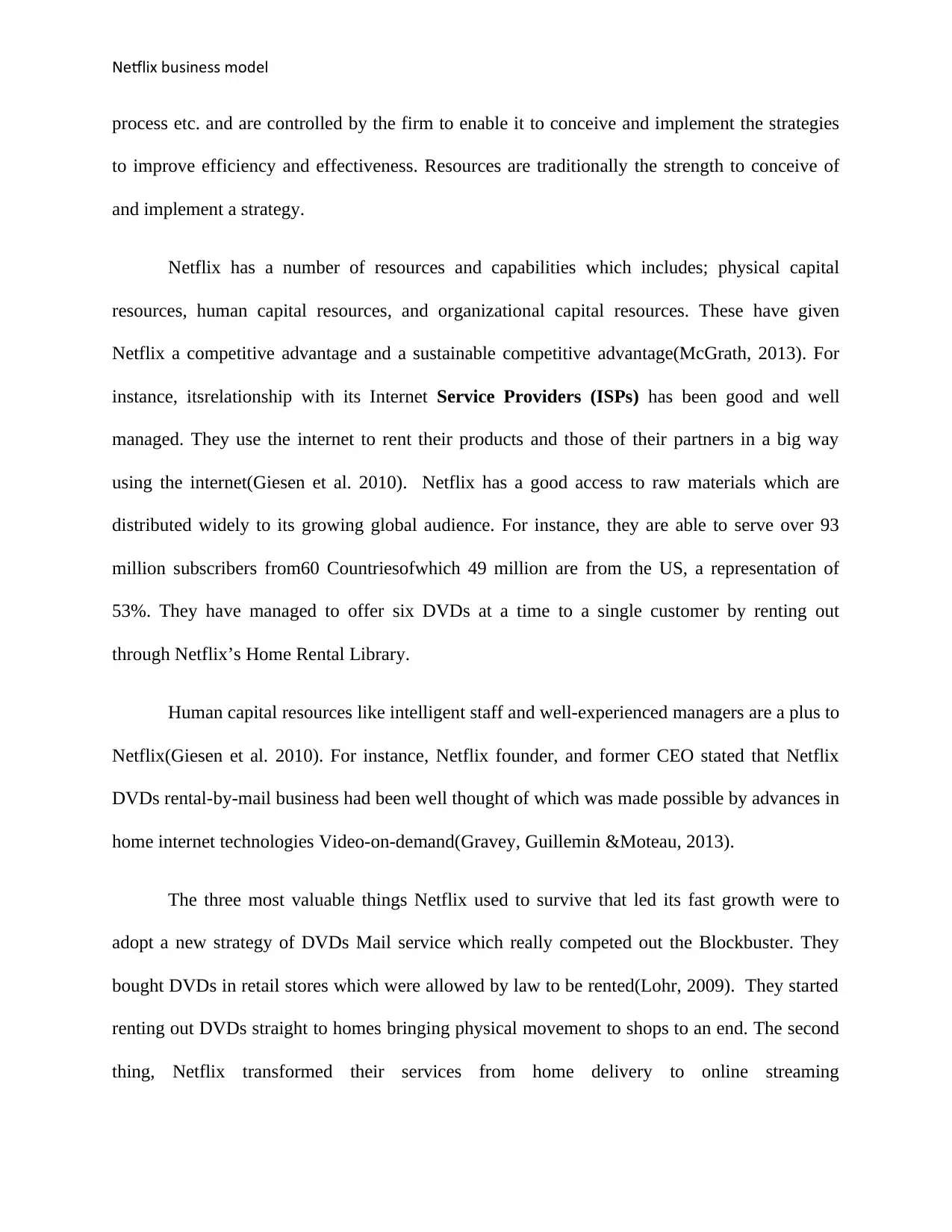
Netflix business model
process etc. and are controlled by the firm to enable it to conceive and implement the strategies
to improve efficiency and effectiveness. Resources are traditionally the strength to conceive of
and implement a strategy.
Netflix has a number of resources and capabilities which includes; physical capital
resources, human capital resources, and organizational capital resources. These have given
Netflix a competitive advantage and a sustainable competitive advantage(McGrath, 2013). For
instance, itsrelationship with its Internet Service Providers (ISPs) has been good and well
managed. They use the internet to rent their products and those of their partners in a big way
using the internet(Giesen et al. 2010). Netflix has a good access to raw materials which are
distributed widely to its growing global audience. For instance, they are able to serve over 93
million subscribers from60 Countriesofwhich 49 million are from the US, a representation of
53%. They have managed to offer six DVDs at a time to a single customer by renting out
through Netflix’s Home Rental Library.
Human capital resources like intelligent staff and well-experienced managers are a plus to
Netflix(Giesen et al. 2010). For instance, Netflix founder, and former CEO stated that Netflix
DVDs rental-by-mail business had been well thought of which was made possible by advances in
home internet technologies Video-on-demand(Gravey, Guillemin &Moteau, 2013).
The three most valuable things Netflix used to survive that led its fast growth were to
adopt a new strategy of DVDs Mail service which really competed out the Blockbuster. They
bought DVDs in retail stores which were allowed by law to be rented(Lohr, 2009). They started
renting out DVDs straight to homes bringing physical movement to shops to an end. The second
thing, Netflix transformed their services from home delivery to online streaming
process etc. and are controlled by the firm to enable it to conceive and implement the strategies
to improve efficiency and effectiveness. Resources are traditionally the strength to conceive of
and implement a strategy.
Netflix has a number of resources and capabilities which includes; physical capital
resources, human capital resources, and organizational capital resources. These have given
Netflix a competitive advantage and a sustainable competitive advantage(McGrath, 2013). For
instance, itsrelationship with its Internet Service Providers (ISPs) has been good and well
managed. They use the internet to rent their products and those of their partners in a big way
using the internet(Giesen et al. 2010). Netflix has a good access to raw materials which are
distributed widely to its growing global audience. For instance, they are able to serve over 93
million subscribers from60 Countriesofwhich 49 million are from the US, a representation of
53%. They have managed to offer six DVDs at a time to a single customer by renting out
through Netflix’s Home Rental Library.
Human capital resources like intelligent staff and well-experienced managers are a plus to
Netflix(Giesen et al. 2010). For instance, Netflix founder, and former CEO stated that Netflix
DVDs rental-by-mail business had been well thought of which was made possible by advances in
home internet technologies Video-on-demand(Gravey, Guillemin &Moteau, 2013).
The three most valuable things Netflix used to survive that led its fast growth were to
adopt a new strategy of DVDs Mail service which really competed out the Blockbuster. They
bought DVDs in retail stores which were allowed by law to be rented(Lohr, 2009). They started
renting out DVDs straight to homes bringing physical movement to shops to an end. The second
thing, Netflix transformed their services from home delivery to online streaming
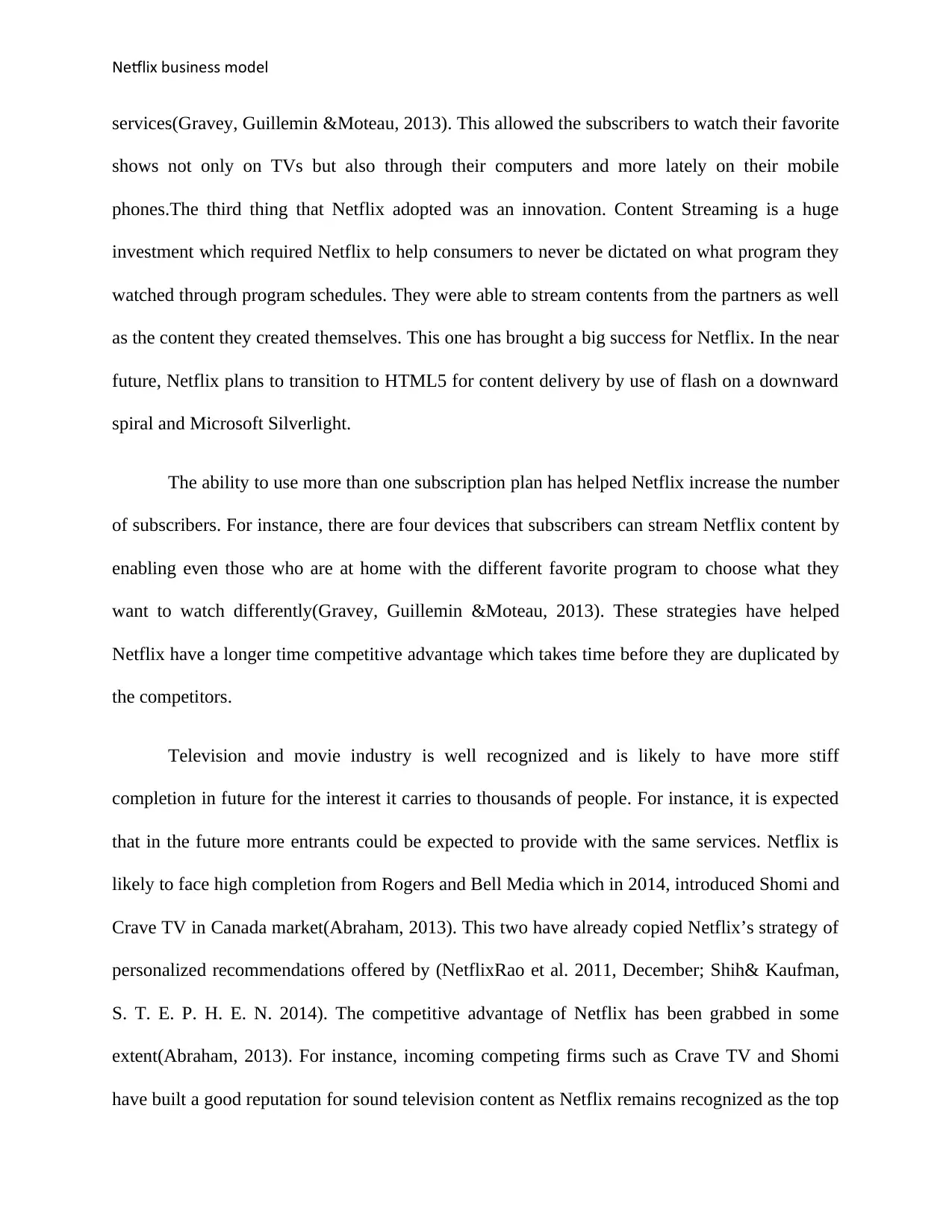
Netflix business model
services(Gravey, Guillemin &Moteau, 2013). This allowed the subscribers to watch their favorite
shows not only on TVs but also through their computers and more lately on their mobile
phones.The third thing that Netflix adopted was an innovation. Content Streaming is a huge
investment which required Netflix to help consumers to never be dictated on what program they
watched through program schedules. They were able to stream contents from the partners as well
as the content they created themselves. This one has brought a big success for Netflix. In the near
future, Netflix plans to transition to HTML5 for content delivery by use of flash on a downward
spiral and Microsoft Silverlight.
The ability to use more than one subscription plan has helped Netflix increase the number
of subscribers. For instance, there are four devices that subscribers can stream Netflix content by
enabling even those who are at home with the different favorite program to choose what they
want to watch differently(Gravey, Guillemin &Moteau, 2013). These strategies have helped
Netflix have a longer time competitive advantage which takes time before they are duplicated by
the competitors.
Television and movie industry is well recognized and is likely to have more stiff
completion in future for the interest it carries to thousands of people. For instance, it is expected
that in the future more entrants could be expected to provide with the same services. Netflix is
likely to face high completion from Rogers and Bell Media which in 2014, introduced Shomi and
Crave TV in Canada market(Abraham, 2013). This two have already copied Netflix’s strategy of
personalized recommendations offered by (NetflixRao et al. 2011, December; Shih& Kaufman,
S. T. E. P. H. E. N. 2014). The competitive advantage of Netflix has been grabbed in some
extent(Abraham, 2013). For instance, incoming competing firms such as Crave TV and Shomi
have built a good reputation for sound television content as Netflix remains recognized as the top
services(Gravey, Guillemin &Moteau, 2013). This allowed the subscribers to watch their favorite
shows not only on TVs but also through their computers and more lately on their mobile
phones.The third thing that Netflix adopted was an innovation. Content Streaming is a huge
investment which required Netflix to help consumers to never be dictated on what program they
watched through program schedules. They were able to stream contents from the partners as well
as the content they created themselves. This one has brought a big success for Netflix. In the near
future, Netflix plans to transition to HTML5 for content delivery by use of flash on a downward
spiral and Microsoft Silverlight.
The ability to use more than one subscription plan has helped Netflix increase the number
of subscribers. For instance, there are four devices that subscribers can stream Netflix content by
enabling even those who are at home with the different favorite program to choose what they
want to watch differently(Gravey, Guillemin &Moteau, 2013). These strategies have helped
Netflix have a longer time competitive advantage which takes time before they are duplicated by
the competitors.
Television and movie industry is well recognized and is likely to have more stiff
completion in future for the interest it carries to thousands of people. For instance, it is expected
that in the future more entrants could be expected to provide with the same services. Netflix is
likely to face high completion from Rogers and Bell Media which in 2014, introduced Shomi and
Crave TV in Canada market(Abraham, 2013). This two have already copied Netflix’s strategy of
personalized recommendations offered by (NetflixRao et al. 2011, December; Shih& Kaufman,
S. T. E. P. H. E. N. 2014). The competitive advantage of Netflix has been grabbed in some
extent(Abraham, 2013). For instance, incoming competing firms such as Crave TV and Shomi
have built a good reputation for sound television content as Netflix remains recognized as the top
Paraphrase This Document
Need a fresh take? Get an instant paraphrase of this document with our AI Paraphraser
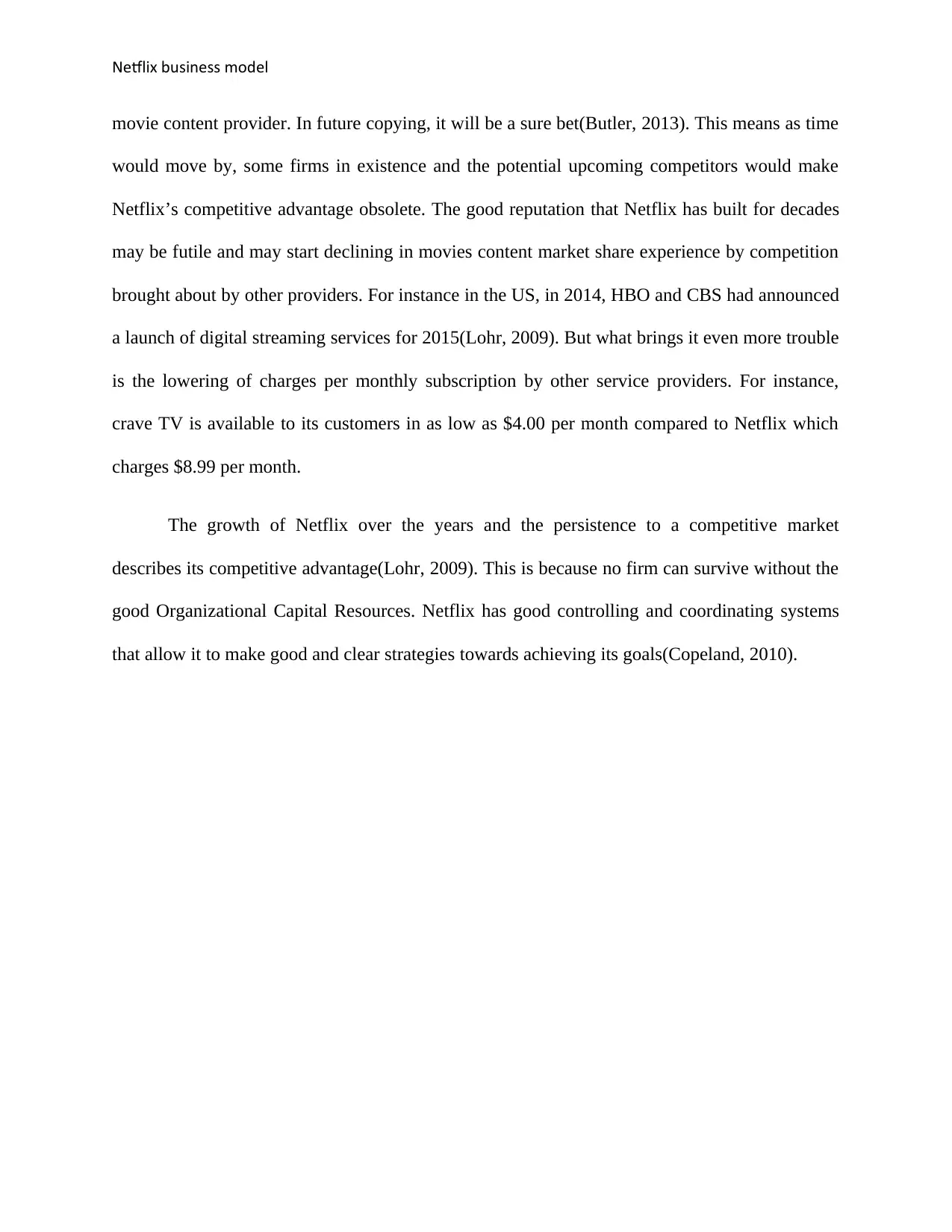
Netflix business model
movie content provider. In future copying, it will be a sure bet(Butler, 2013). This means as time
would move by, some firms in existence and the potential upcoming competitors would make
Netflix’s competitive advantage obsolete. The good reputation that Netflix has built for decades
may be futile and may start declining in movies content market share experience by competition
brought about by other providers. For instance in the US, in 2014, HBO and CBS had announced
a launch of digital streaming services for 2015(Lohr, 2009). But what brings it even more trouble
is the lowering of charges per monthly subscription by other service providers. For instance,
crave TV is available to its customers in as low as $4.00 per month compared to Netflix which
charges $8.99 per month.
The growth of Netflix over the years and the persistence to a competitive market
describes its competitive advantage(Lohr, 2009). This is because no firm can survive without the
good Organizational Capital Resources. Netflix has good controlling and coordinating systems
that allow it to make good and clear strategies towards achieving its goals(Copeland, 2010).
movie content provider. In future copying, it will be a sure bet(Butler, 2013). This means as time
would move by, some firms in existence and the potential upcoming competitors would make
Netflix’s competitive advantage obsolete. The good reputation that Netflix has built for decades
may be futile and may start declining in movies content market share experience by competition
brought about by other providers. For instance in the US, in 2014, HBO and CBS had announced
a launch of digital streaming services for 2015(Lohr, 2009). But what brings it even more trouble
is the lowering of charges per monthly subscription by other service providers. For instance,
crave TV is available to its customers in as low as $4.00 per month compared to Netflix which
charges $8.99 per month.
The growth of Netflix over the years and the persistence to a competitive market
describes its competitive advantage(Lohr, 2009). This is because no firm can survive without the
good Organizational Capital Resources. Netflix has good controlling and coordinating systems
that allow it to make good and clear strategies towards achieving its goals(Copeland, 2010).
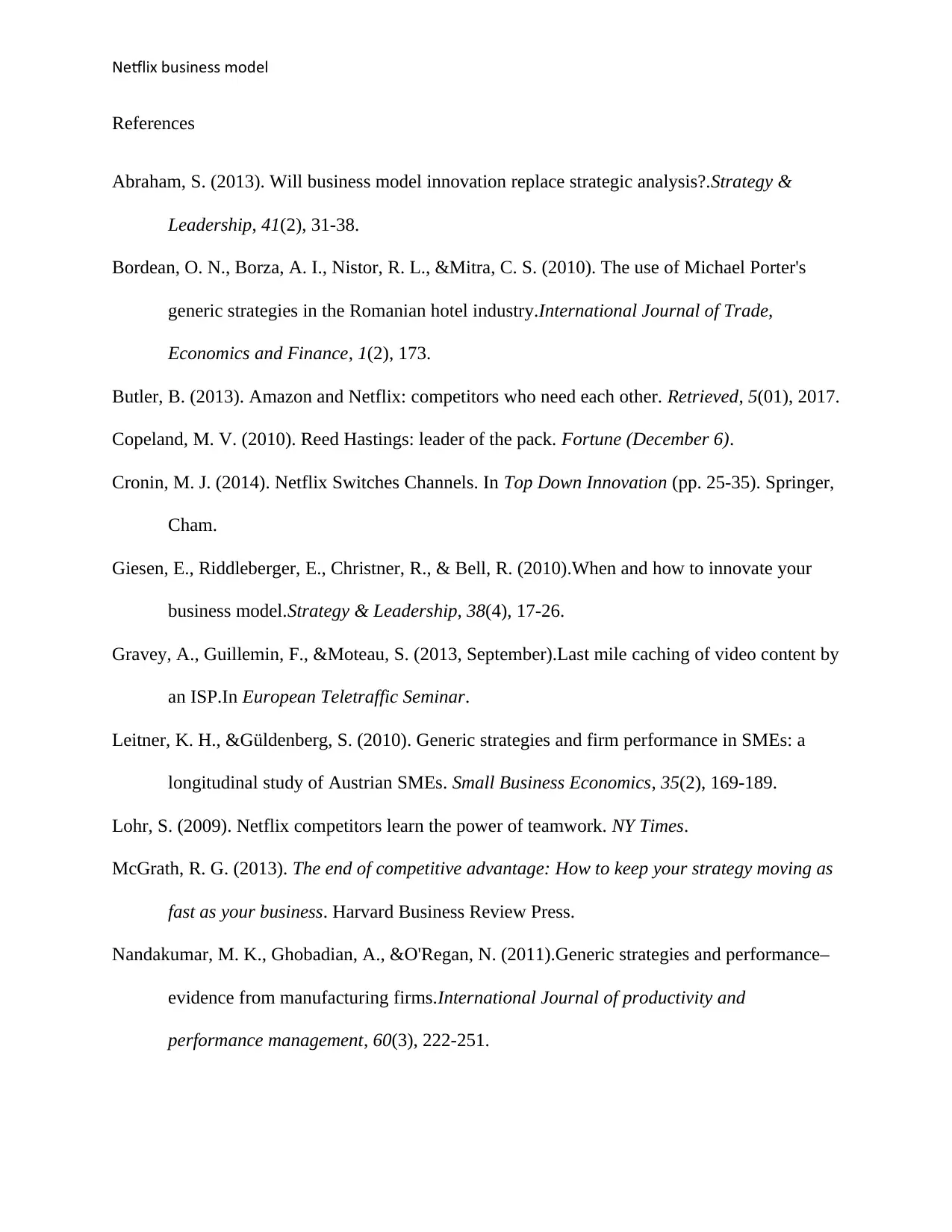
Netflix business model
References
Abraham, S. (2013). Will business model innovation replace strategic analysis?.Strategy &
Leadership, 41(2), 31-38.
Bordean, O. N., Borza, A. I., Nistor, R. L., &Mitra, C. S. (2010). The use of Michael Porter's
generic strategies in the Romanian hotel industry.International Journal of Trade,
Economics and Finance, 1(2), 173.
Butler, B. (2013). Amazon and Netflix: competitors who need each other. Retrieved, 5(01), 2017.
Copeland, M. V. (2010). Reed Hastings: leader of the pack. Fortune (December 6).
Cronin, M. J. (2014). Netflix Switches Channels. In Top Down Innovation (pp. 25-35). Springer,
Cham.
Giesen, E., Riddleberger, E., Christner, R., & Bell, R. (2010).When and how to innovate your
business model.Strategy & Leadership, 38(4), 17-26.
Gravey, A., Guillemin, F., &Moteau, S. (2013, September).Last mile caching of video content by
an ISP.In European Teletraffic Seminar.
Leitner, K. H., &Güldenberg, S. (2010). Generic strategies and firm performance in SMEs: a
longitudinal study of Austrian SMEs. Small Business Economics, 35(2), 169-189.
Lohr, S. (2009). Netflix competitors learn the power of teamwork. NY Times.
McGrath, R. G. (2013). The end of competitive advantage: How to keep your strategy moving as
fast as your business. Harvard Business Review Press.
Nandakumar, M. K., Ghobadian, A., &O'Regan, N. (2011).Generic strategies and performance–
evidence from manufacturing firms.International Journal of productivity and
performance management, 60(3), 222-251.
References
Abraham, S. (2013). Will business model innovation replace strategic analysis?.Strategy &
Leadership, 41(2), 31-38.
Bordean, O. N., Borza, A. I., Nistor, R. L., &Mitra, C. S. (2010). The use of Michael Porter's
generic strategies in the Romanian hotel industry.International Journal of Trade,
Economics and Finance, 1(2), 173.
Butler, B. (2013). Amazon and Netflix: competitors who need each other. Retrieved, 5(01), 2017.
Copeland, M. V. (2010). Reed Hastings: leader of the pack. Fortune (December 6).
Cronin, M. J. (2014). Netflix Switches Channels. In Top Down Innovation (pp. 25-35). Springer,
Cham.
Giesen, E., Riddleberger, E., Christner, R., & Bell, R. (2010).When and how to innovate your
business model.Strategy & Leadership, 38(4), 17-26.
Gravey, A., Guillemin, F., &Moteau, S. (2013, September).Last mile caching of video content by
an ISP.In European Teletraffic Seminar.
Leitner, K. H., &Güldenberg, S. (2010). Generic strategies and firm performance in SMEs: a
longitudinal study of Austrian SMEs. Small Business Economics, 35(2), 169-189.
Lohr, S. (2009). Netflix competitors learn the power of teamwork. NY Times.
McGrath, R. G. (2013). The end of competitive advantage: How to keep your strategy moving as
fast as your business. Harvard Business Review Press.
Nandakumar, M. K., Ghobadian, A., &O'Regan, N. (2011).Generic strategies and performance–
evidence from manufacturing firms.International Journal of productivity and
performance management, 60(3), 222-251.
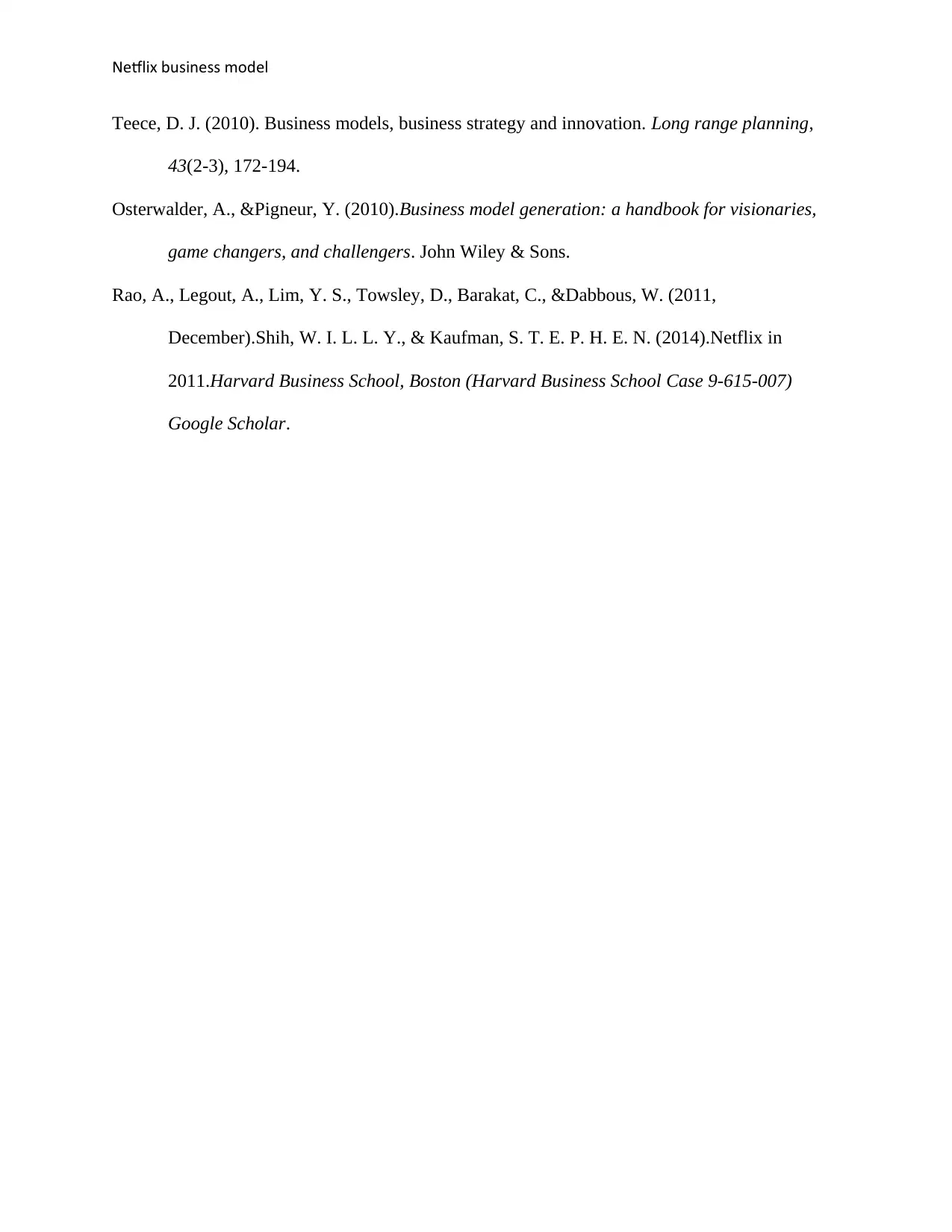
Netflix business model
Teece, D. J. (2010). Business models, business strategy and innovation. Long range planning,
43(2-3), 172-194.
Osterwalder, A., &Pigneur, Y. (2010).Business model generation: a handbook for visionaries,
game changers, and challengers. John Wiley & Sons.
Rao, A., Legout, A., Lim, Y. S., Towsley, D., Barakat, C., &Dabbous, W. (2011,
December).Shih, W. I. L. L. Y., & Kaufman, S. T. E. P. H. E. N. (2014).Netflix in
2011.Harvard Business School, Boston (Harvard Business School Case 9-615-007)
Google Scholar.
Teece, D. J. (2010). Business models, business strategy and innovation. Long range planning,
43(2-3), 172-194.
Osterwalder, A., &Pigneur, Y. (2010).Business model generation: a handbook for visionaries,
game changers, and challengers. John Wiley & Sons.
Rao, A., Legout, A., Lim, Y. S., Towsley, D., Barakat, C., &Dabbous, W. (2011,
December).Shih, W. I. L. L. Y., & Kaufman, S. T. E. P. H. E. N. (2014).Netflix in
2011.Harvard Business School, Boston (Harvard Business School Case 9-615-007)
Google Scholar.
1 out of 10
Related Documents
Your All-in-One AI-Powered Toolkit for Academic Success.
+13062052269
info@desklib.com
Available 24*7 on WhatsApp / Email
![[object Object]](/_next/static/media/star-bottom.7253800d.svg)
Unlock your academic potential
© 2024 | Zucol Services PVT LTD | All rights reserved.





